- Home
- Melissa de la Cruz
Alex and Eliza--A Love Story Page 24
Alex and Eliza--A Love Story Read online
Page 24
Eliza was first shocked, and then, for the first time since the attack, amused. She had always known Aunt Gertrude to be an unconventional, independent woman, but she never guessed that she carried quite this level of bile in her. She felt exceedingly grateful that she was under this remarkable woman’s protection.
“Let us write Mama and Papa, then,” Eliza decided. “It will take at least a week before we hear back from them, but we can say my condition has taken a turn for the worse. It is a lie, but a white lie, and I shall do penance for it later.”
The letter to the Schuylers was duly sent, along with a second, surreptitious note that Eliza slipped to the footman when he went to post the first. The second note was to Alex, but to her dismay, Loewes brought it back with him upon his return.
“I am told that Colonel Hamilton has not been seen since the night of his return from Amboy,” the footman said, tactfully not referring to the parties that had ended in such disaster. “General Washington is said to be furious. The spring campaigns are about to get underway, and Colonel Hamilton’s absence is a great handicap to their organizational abilities.”
“What?” Elisa said fearfully. “Has no one any idea where Colonel Hamilton has gone?”
“None, I’m afraid, but if you like, Miss Schuyler, I can continue to make inquiries.”
“Please do,” Eliza begged. “But do be discreet. I do not want to compound an already scandalous situation by dragging him into it.”
Loewes was gone much of the rest of that day and the next, and at least he was able to return with some positive news. Colonel Hamilton had been seen at the coach station in the wee hours of Wednesday morning, where he had requisitioned one of the mail horses. Last seen he was galloping north.
“North?” Eliza repeated. “But he knows no one in the north. Such friends as he has in North America—Colonel Laurens and General Lafayette and a few others—are all in the south.”
“The clerk on duty said that Colonel Hamilton gave no hint as to his destination, but he did ask where he could change horses, and the clerk told him that the next stop on the Albany Post Road was at Boone-Towne.”
Albany? Could it be . . . ? Was Alex going to see . . . her parents?
But Loewes was still speaking.
“That said, Miss Schuyler, the clerk informed me that Colonel Hamilton never made an appearance at the Boone-Towne station, so it is entirely possible that he asked his question only to throw any pursuers off his trail.”
Eliza didn’t know what to think. Nor did she have much time to consider it, for the following day—a Monday—she had a rather unexpected visitor: Governor William Living-ston himself.
The governor appeared in the late morning. He came on his own, on foot, and from the way he halloed at the people who passed him by on the street, you would have thought he was merely taking his morning constitutional, or even campaigning for reappointment.
But once the maid had shown him into the parlor, and Aunt Gertrude and Eliza had joined him, his countenance immediately turned sour.
“Mrs. Cochran,” he said, addressing Aunt Gertrude, though his condemning gaze rested upon Eliza, “this siege has gone on almost as long as the British occupation of New York. It is time to surrender.”
“Surrender, you say?” Aunt Gertrude repeated in an incredulous voice. “And is this how you would have your son commence his married life—with a bride he first attempted to defile, and then coerce into marriage? I wonder that you are not ashamed even to make such a request aloud.”
“Mrs. Cochran,” Governor Livingston said in a tight voice, “out of respect of your and your niece’s femininity, I will not respond to such charges as I normally would. But I must insist that you do not slander my son’s name even in such limited circles as these. He has his reputation to think about, after all. What occurred was regrettable, but it was a moment of youthful indiscretion, complicated by the pressures of war and the debilitation of alcohol. You cannot think this behavior representative of my son’s character, let alone my family’s.”
“I cannot think anything else,” Aunt Gertrude said, speaking on behalf of Eliza. “Such behavior cannot be seen as exceptional, but as the true measure of a man’s character.”
“This is my son you are speaking of, Mrs. Cochran,” Governor Livingston said coldly. “I would ask that you consider your remarks.”
Aunt Gertrude was unbowed. “And I would ask that you consider yours. You have raised a scoundrel, sir, and all of Morristown knows it. He moved seven injured men from their beds in the infirmary for the sake of throwing himself a party. To a house whose reputation I cannot bring myself to utter in the presence of my niece! It is a miracle none of them died.”
“But none of them did die, and neither was Miss Schuyler harmed on the night in question. Let my son do the chivalrous thing and marry your niece, despite her own rather base attempts to slander his reputation.”
Aunt Gertrude guffawed.
“I must say, Governor Livingston, I’m rather shocked you would invoke chivalry now, when it was so sorely lacking from your son’s heart and actions several days ago. And as for reputation, the drunkard, rascal, and bounder whom you call a son is more than capable of staining his honor without the assistance of a couple of feeble ladies.”
Governor Livingston’s face turned beet red. “I have heard quite enough,” he said, barely able to control his voice. “Miss Schuyler will present herself at my house on Thursday afternoon, exactly one week after the originally scheduled date, where she will marry my son in the presence of his family and of such of hers as are in Morristown, and that is my final dictate.”
“Or what?” Eliza spoke up now. “You’ll drag me there by my heels? I can only imagine how that will look.”
Governor Livingston turned on her coldly. “Do you think I have no ammunition at my disposal, Miss Schuyler? Your family’s financial troubles may not be generally known, but I can assure you that I know them and can destroy General Schuyler’s reputation with but a few well-placed asides. Your elder sister has already caused a scandal by eloping with a British rascal who many believe to be a spy for King George, and your younger sister has all but been sold to the Van Rensselaer child so as to save your family’s fortune. You yourself were known to have consorted with Colonel Alexander Hamilton until but directly before you announced your engagement to my son. Do you think that anyone will believe you did not throw over your paramour for the sake of our family’s money? Your family may not have any money left to lose, but there are still many other things that can be taken from you.”
Eliza was rendered speechless. She could only stare in shock at this, the most powerful man in the state of New Jersey, threatening to destroy her entire family for the sake of a petty grievance.
Aunt Gertrude also didn’t say anything. However, she did stand up and go to a small escritoire on the far wall. She opened a drawer and pulled out a case, which it took Eliza a moment to recognize. It was her aunt’s medical case—the same one in which she had once carried the supplies for the smallpox inoculation. She opened it now and pulled out a small vial—the same type of vial that had contained the inoculum.
She turned back to the governor and walked toward him slowly.
“Do you know what this is, Governor Livingston?”
“How should I know what that is?” Governor Livingston replied haughtily.
“Indeed, how should you? Despite your high station, you are in many ways a terribly ignorant man. This,” Aunt Gertrude continued, holding up the vial with a flourish, “is a tincture of the great pox itself.”
Governor Livingston gasped and drew back.
“Madam! You cannot be serious.”
“Serious? Furious is more like it. That you could come into my house and speak to my niece with such effrontery. It is even more disgraceful than your son’s action. No doubt we all now know where he gets it from.
Well, I shall not have you in my house any longer. Either you leave this instant, or I uncap this vial and pour it all over you.”
Governor Livingston stood up and stepped behind his chair.
“You wouldn’t dare!”
“Wouldn’t I? You have attempted to corner a mother hen, Governor. Yet there is no animal fiercer than a mother who fights to protect her young, and I think of Eliza as the daughter I never had.”
“Madam, I implore you—”
“I am an old woman,” Aunt Gertrude cut the governor off. “My hands have started to tremble of late, and in my agitated state who knows what might happen. I would suggest you leave before an accident occurs.”
The governor hung fire for one more moment, then turned and ran out the door.
Aunt Gertrude turned to Eliza with a smile. Eliza drew back in horror at the vial, which sat carelessly in her aunt’s hand.
“Aunt Gertrude! Do be careful!”
“Relax, dear, it’s just smelling salts.”
Eliza stared in disbelief for a moment, and then collapsed into the sofa in relief.
“Aunt Gertrude! You are a hero! Whatever else happens, I will always have this memory.”
“I don’t expect it will keep the governor at bay for long. I do wish we would hear back from General Schuyler. There is only so much a woman can do on her own.”
Eliza nodded her head, but it wasn’t her parents she was thinking of.
Where is Alex? she asked herself for the thousandth time. How could he have left me now, when I need him most?
As if he’d read her mind, Loewes entered the parlor. The footman had a concerned look on his face.
“Yes, Loewes, what is it?” Aunt Gertrude said in a commanding voice.
Loewes grimaced. “I just thought that Miss Schuyler might like to know that the horse Colonel Hamilton requisitioned from the mail coach was found yesterday.”
“Found? What do you mean, found?”
“It wandered into the Boone-Towne station. It was still saddled but quite riderless. I’m afraid, Miss—I’m afraid there was quite a bit of blood on the saddle.”
33
Ambush
The Post Road
Outside Boone-Towne, New Jersey
April 1780
After four years of army life, Alex had come to know a bit about men—the good, the bad, the heroic, the unspeakable. He had met Henry Livingston’s type before. He knew that when Henry Livingston awoke in the morning, if he had any memory of what he’d done, he would find a way to blame it on Eliza or on alcohol. On anyone but himself. Which is to say, there was no way a man like Henry Livingston would do the honorable thing and release Eliza from her engagement. The Livingstons were a venerable clan, but perhaps too proud. They, too, would be more inclined to sweep the affair under the rug rather than admit wrongdoing. No, if anyone was going to put an end to this disastrous union it was going to be the Schuylers.
It was up to him to get to them in time.
Albany was some 140 miles from Morristown. If Alex rode all night and through the following day, he could reach the Pastures by nightfall Thursday evening. He would need multiple horses, though, which meant commandeering them. The mail coach would have an ample supply, and as a colonel on General Washington’s staff, Alex should be able to pull rank and commandeer one. No doubt he would be chastised for it when all was said and done, but this was the last chance to win Eliza. He would risk anything—even his career.
It took ten minutes of pounding before the station clerk opened the door, and another ten minutes before Alex was able to make it clear what he wanted and that he wouldn’t take no for an answer. Ten minutes later he was mounted on a gray Arabian—the fastest horse in the stable, the clerk said.
A three-quarters moon lit the road, which the horse seemed to know quite well. Alex knew the road, too. It was the same route he had traversed almost every day for a week in February, when he was waiting for Eliza to show up. He settled into the saddle and let the horse have his head. He had been awake for nearly eighteen hours at this point, and already logged some thirty miles on horseback that day in the journey from Amboy and had been twice soaked through. He was exhausted, sore, and chilled, but alternating waves of anger and passion drove him on. An hour went by, then another. The moon sank low in the sky, and a hint of light appeared in the east. Not dawn, but its promise.
Alex didn’t remember seeing the horses appear on the road ahead of him. Afterward he realized they must have come from the thick forest that shrouded the west side of the road and were crossing it to get under cover of the trees on the other side, but when he first saw them he had the impression that they had appeared out of thin air.
I must have fallen asleep, he thought.
The riders seemed as surprised by his presence as he was by theirs. They pulled up short, the horses’ noses still pointing west but the riders’ faces all turned south, to stare at him. Then he understood: Their faces were covered by kerchiefs.
Bandits!
He pulled his horse up short, but it was too late. The three riders had spurred their mounts toward him, and before he was able to turn around, they were on him. He had seen their muskets come unslung as they rode toward him and ducked down against his horse’s neck just in time. He heard the crack of a gunshot and the whiz of a musket ball past his ear. A moment later he felt a searing pain in his shoulder and realized the ball must’ve grazed him as it flew by.
The shooter would not be able to reload on horseback, but there were still two others. Alex knew he was an easy mark as long he was mounted, and so threw himself off his horse on its lee side. The Arabian was agitated but stayed in place, even as Alex pulled his musket free. He stepped quickly from behind his horse, aimed at one of the two riders trying to get a bead on him with their muskets and fired. A shower of blood haloed the rider’s masked face, and then he fell from the saddle.
As he fell, though, the man’s greatcoat slipped open, and Alex saw a flash of crimson within.
Redcoats! They must be on a raiding mission from their base on the island of Manhattan. It was incredibly daring of them to come this far. They must have been after some very big prize indeed.
The two remaining riders were on him now. Alex kept his horse between himself and his attackers, especially the one with the drawn gun; as they wheeled around the Arabian, Alex stabbed blindly with the bayonet mounted on his musket’s muzzle. He missed the rider but felt his blade sink into the quivering muscle of the horse’s croup. The animal was more frightened than hurt and reared back on his hind legs, sending its rider sprawling to the ground.
Alex didn’t hesitate. He fell to one knee and drove the bayonet into the exposed red breast of the second raider. The rider had dropped his musket. Alex wasn’t sure whether it was loaded or not, but he threw his own musket aside and grabbed it anyway. The remaining rider was wheeling around for a final charge, holding his musket front of him like a lance, not planning to fire it.
Alex had the one loaded weapon remaining. He lifted it to his shoulder and took steady aim. The rider bore down on him in a clatter of thundering hooves. Alex waited until he was sure he couldn’t miss, and then fired. The rider flew off the back of his horse as though his head had been caught in a wire. The riderless horse charged on, though, and Alex had to throw himself out of the way. He landed painfully on his wounded shoulder, which tore and throbbed all at the same time.
He forced himself to get up, his fingers scrambling for a weapon. But it was unnecessary. Three prone figures lay on the road, none of them moving. The Arabian had run off, but two of his attackers’ horses remained. Though he was desperate to get on with his private mission, he knew he would be remiss in his duty if he did not at least search the three men who had attacked, since they were clearly spies of some sort. Two of them were devoid of anything other than common implements of war, but the third had a p
assel of folded papers in his hand, one of which was sealed with wax bearing the stamp of the Contintental army. There were perhaps a dozen officers in the entire army who commanded such an insignia. It wasn’t his purview—and was probably above his station—but he couldn’t stop himself from opening it. “My dear Major André,” he read, followed by a list of American troop movements. But the signature at the end was the most shocking part of it all: “Yours very sincerely, General Benedict Arnold.”
Alex couldn’t believe what he had found. Evidence of treason involving one of the most decorated American heroes. And with John André, no less, that handsome British officer who had nearly swept Eliza off her feet at the same party where Alex met her. He couldn’t believe that he had stumbled across such a momentous discovery, and knew he needed to report it immediately. But other business called him north. Reasoning that André would not be able to act without this intelligence, Alex assumed he had a day or two before he was truly derelict in his duty. And who better to report treason to than another general?
Limping slowly and mouthing soothing words, he made his way to the nearest one. Its nostrils flaring at the scent of blood, it was clearly an experienced warhorse, waiting cautiously while he approached it. Alex found he couldn’t heave himself up with his right arm, and so had to pull awkwardly with his left, but eventually managed to get himself into the saddle, still warm from the heat of its last rider.
He took one last look at the three spies strewn across the road.
“No one will ever believe this,” he said and, spurring his mount, jumped over the nearest corpse, and resumed his journey north.
THE NEXT THING he knew he was waking up in an exquisitely soft feather bed. His shoulder ached and his vision swam, but when he could focus again he saw the handsome trappings of a well-appointed bedroom, a boy’s room, judging from the articles of clothing he saw here and there, and the musket and sword mounted on pegs in the wall.

 Gates of Paradise
Gates of Paradise Someone to Love
Someone to Love Pride and Prejudice and Mistletoe
Pride and Prejudice and Mistletoe Serpent's Kiss
Serpent's Kiss The Au Pairs
The Au Pairs Wolf Pact
Wolf Pact Witches 101: A Witches of East End Primer
Witches 101: A Witches of East End Primer Jealous?
Jealous? Cat's Meow
Cat's Meow Misguided Angel
Misguided Angel Birthday Vicious
Birthday Vicious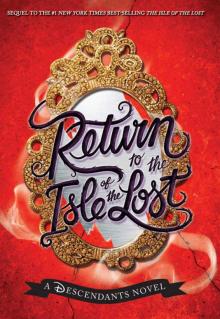 Return to the Isle of the Lost
Return to the Isle of the Lost Rise of the Isle of the Lost
Rise of the Isle of the Lost Angels on Sunset Boulevard
Angels on Sunset Boulevard Double Eclipse
Double Eclipse Blue Bloods
Blue Bloods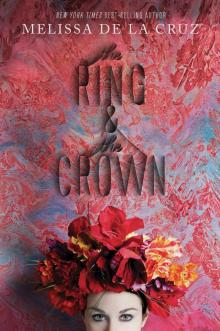 The Ring and the Crown
The Ring and the Crown The Ashleys
The Ashleys Les vampires de Manhattan
Les vampires de Manhattan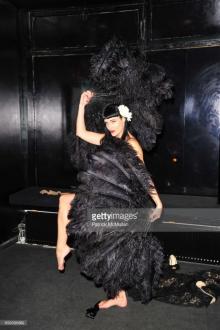 The Van Alen Legacy
The Van Alen Legacy Sun-Kissed
Sun-Kissed The Isle of the Lost
The Isle of the Lost Masquerade
Masquerade Witches of East End
Witches of East End Diary of the White Witch
Diary of the White Witch Crazy Hot
Crazy Hot Lost in Time
Lost in Time White Nights: A Vampires of Manhattan Novel
White Nights: A Vampires of Manhattan Novel Revelations
Revelations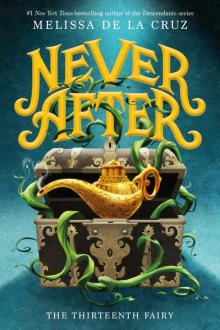 The Thirteenth Fairy
The Thirteenth Fairy The Birthday Girl
The Birthday Girl Lip Gloss Jungle
Lip Gloss Jungle Fresh Off the Boat
Fresh Off the Boat Something in Between
Something in Between Winds of Salem
Winds of Salem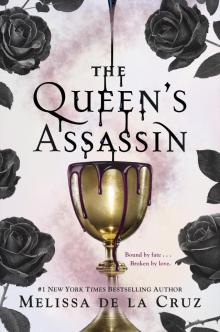 The Queen's Assassin
The Queen's Assassin Love & War
Love & War Social Order
Social Order Skinny Dipping
Skinny Dipping 29 Dates
29 Dates Popularity Takeover
Popularity Takeover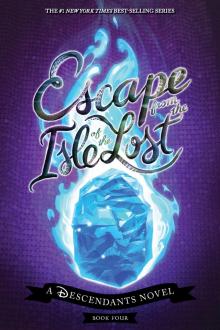 Escape from the Isle of the Lost
Escape from the Isle of the Lost Beach Lane
Beach Lane Bloody Valentine
Bloody Valentine All for One
All for One Wolf Pact: A Wolf Pact Novel
Wolf Pact: A Wolf Pact Novel The au pairs skinny-dipping
The au pairs skinny-dipping Lip Gloss Jungle (Ashleys)
Lip Gloss Jungle (Ashleys) Crazy Hot (Au Pairs)
Crazy Hot (Au Pairs) Because I Was a Girl
Because I Was a Girl Blue Bloods 6 - Lost in Time
Blue Bloods 6 - Lost in Time Sun-kissed (Au Pairs, The)
Sun-kissed (Au Pairs, The) Bloody Valentine bb-6
Bloody Valentine bb-6 Golden
Golden Lost in Time_A Blue Bloods Novella
Lost in Time_A Blue Bloods Novella Alex and Eliza--A Love Story
Alex and Eliza--A Love Story Blue Bloods: Keys to the Repository
Blue Bloods: Keys to the Repository Birthday Vicious (The Ashleys, Book 3)
Birthday Vicious (The Ashleys, Book 3)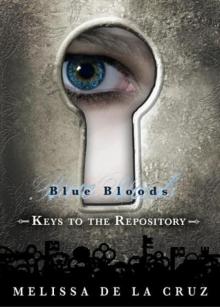 Keys to the Repository
Keys to the Repository Lost In Time (Blue Bloods Novel)
Lost In Time (Blue Bloods Novel) Stolen
Stolen Girls Who Like Boys Who Like Boys
Girls Who Like Boys Who Like Boys the au pairs crazy hot
the au pairs crazy hot Blue Bloods bb-1
Blue Bloods bb-1 Witches 101
Witches 101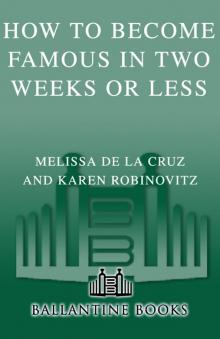 How to Become Famous in Two Weeks or Less
How to Become Famous in Two Weeks or Less Frozen hod-1
Frozen hod-1 Jealous? (The Ashleys, Book 2)
Jealous? (The Ashleys, Book 2) Misguided Angel (Blue Bloods)
Misguided Angel (Blue Bloods) Winds of Salem: A Witches of East End Novel
Winds of Salem: A Witches of East End Novel The Gates of Paradise
The Gates of Paradise Beach Lane Collection
Beach Lane Collection Wolf Pact, The Complete Saga
Wolf Pact, The Complete Saga Gates of Paradise, The (Blue Bloods Novel)
Gates of Paradise, The (Blue Bloods Novel) Vampires of Manhattan
Vampires of Manhattan Isle of the Lost
Isle of the Lost Love & War_An Alex & Eliza Story
Love & War_An Alex & Eliza Story The Ashley Project
The Ashley Project Love & War--An Alex & Eliza Story
Love & War--An Alex & Eliza Story